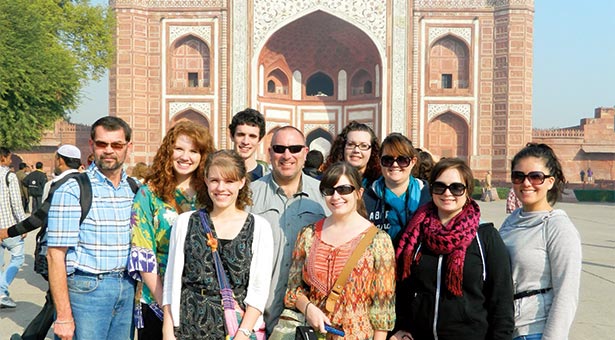The World Acting Globally
Business Program Gives Grads an International
View — and Job Placement
Global to Local
By Hannah Notess (hnotess@spu.edu) | Photo Courtesy of Carolina Bravo

Students and faculty of the MASSM program pose in front of the gateway to the Taj Mahal.
Wrapping up a degree in political science at the University of Washington in the spring of 2011, Braden Unger was looking for a job. He had worked with non-profits focused on international development. “I was looking for professional opportunities to do that, but it turned out that the big need was people who have business skills,” he says.
While discussing the business gap in his education over coffee with a Seattle Pacific University faculty member, he learned about SPU’s master of arts in management with a specialization in social and sustainable management program. He soon enrolled.
Gary Karns, professor of marketing and associate dean for graduate programs in Seattle Pacific’s School of Business and Economics, says that when the economy slid in 2007, he saw a need to help liberal arts graduates gain business skills that employers were seeking.
“I wanted to deliver a really high-quality learning experience that provided a layer of business education — an understanding of how business works and how it ought to work — particularly from the Christian perspective,” he says.
“The program is really very different from most other graduate programs in terms of the way that it’s taught and the way it’s totally integrated,” says Assistant Professor of Marketing Vicki Eveland, the program’s director. “It’s really got an amazing amount of complexity, but yet it has all of the elements that students need.”
A three-week study abroad trip to India and China built into the 11-month intensive program gives students international perspective on responsible and sustainable business.
Rachel Perez ’12 appreciated seeing the global marketplace in action. “India was absolutely beautiful. We got to meet some great companies and individuals in India that are doing a lot of microfinance,” Perez says of the trip.
In China, the focus was on domestic companies doing work abroad. “It was interesting to see how Nike especially was able to make its factory in Shanghai really green.”
The program concludes with a practicum. Perez spent hers with Pioneer Industries, a Seattle-based enterprise that does manufacturing work to sustain its work providing housing, substance-abuse aid, and employment opportunities to people in need of assistance.
Throughout the year, students worked with employment counselor Daniel Hallak on their résumés, interviewing skills, and networking. Of the eight students in the first class, “all of them had a job within three weeks of graduation,” Hallak says.
Perez rolled from her practicum into a job as a business and financial analyst with Pioneer. Unger had nearly 45 informational interviews and landed a job as a project manager with Bloom Consulting, handling projects for Microsoft.
The program gave Unger the business skills he needed to get hired — and something more: “We spent time learning about how business can be used to solve social needs and provide value, not just monetary, to the community.”
